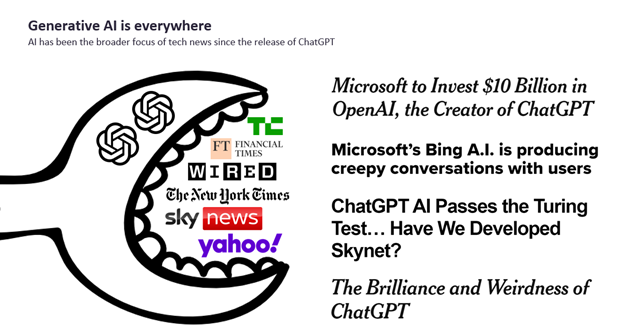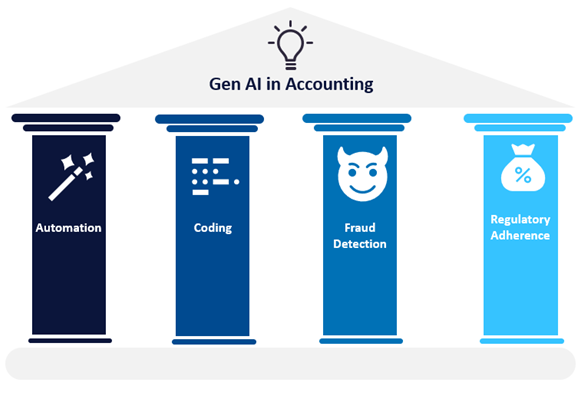Generative AI
Generative AI’s place in the accounting sector
Shabnam Pervez, Thematic Analyst at GlobalData, explores the potential and increasing integration of ChatGPT across the accountancy sector

Cloud computing has become a key technology enabler for accounting firms. Cloud infrastructure can be used to store data and applications and provide remote access to the same systems. Furthermore, cloud computing provides firms with a more flexible business model and lowers operational costs. Usage-based billing, business continuity, and business agility are some of the other benefits cloud offers compared to implementing ICT solutions on-premises.
A GlobalData report explains that although cloud adoption has significant benefits, some key considerations must be factored in during migration or adoption. Not advancing cautiously and failing to adopt cloud services in a resourceful and efficient manner could considerably harm financial institutions. For example, in 2018, TSB Bank left its customers unable to access their banking services and allowed some customers to see the details of other transactions due to a botched cloud migration. The aftermath of this cost the bank almost GBP200 million ($236 million) on top of the statutory loss of GBP107.4 million ($130 million). After an independent review in December 2022, the bank was fined a further GBP48.6 million ($60 million) as the review concluded that TSB had insufficient oversight of its suppliers.
Cloud growth has reportedly slowed across sectors as cloud projects have been deprioritised due to the poor economic climate, rising costs, and skill shortages. This is unsurprising due to the high costs and risks involved in cloud migration. Many of the benefits of cloud adoption can’t be seen immediately as new revenue opportunities or efficiencies only benefit enterprises in the long term. This means that even if cloud infrastructure could provide vast improvements to processes, an expensive cloud migration can seem unappealing for enterprises, especially if the existing infrastructure works satisfactorily.
What is Generative AI?

Source: GlobalData
Generative AI (Gen AI) reached an inflection point in 2022 with the launch of ChatGPT and has taken the world by storm in 2023. Gen AI refers to self-learning algorithms that use existing data, such as text, audio, or images, to produce realistic new content. Examples of Gen AI include image and video synthesis, text generation, and music composition. According to GlobalData forecasts, the global Gen AI market will grow at a compound annual growth rate (CAGR) of 80% between 2022 and 2027.

Source: GlobalData
Unsuprisingly, several accounting companies are jumping on the Gen AI bandwagon. KPMG is adopting Gen AI as part of an in-house system that aims to improve efficiency and insights. PwC is also on a Gen AI mission and will invest $1 billion to improve its Gen AI presence in the US within the next three years. The company has also partnered with both Microsoft and OpenAI to automate tasks and increase overall efficiency.

Source: GlobalData
Generative AI has the potential to significantly benefit the accountancy sector in different ways
One of the key ways the accounting sector can use Gen AI is to automate routine tasks including invoice processing, data entry, and report generation. Not only can automation save time, but it can also reduce the risk of errors associated with manual data input. According to survey data from Thomson Reuters, 75% of corporate users reported that ChatGPT reduced time spent on low-value work, enabling staff to focus on higher-value projects, while 58% of tax firm users said the time saved resulted in an ability to focus on higher-value work, while 58% of tax firm users said the time saved resulted in an ability to focus on work with more value.
Gen AI can also be used for coding as the tech can automatically generate code snippets or even complete programmes based on high-level descriptions or user input. Investment bank Goldman Sachs is using Gen AI tools to help its software developers write and test code. The project is currently just a proof of concept, but has seen Gen AI write as much as 40% of the code for some use cases. This approach could reduce time-to-market on a wide variety of new features and functionalities, such as what-if scenarios, aggregation, and ESG investing.
Gen AI can be used for data analysis and production of financial reports and forecasts. By learning from historical financial data, Gen AI models can capture complex patterns and relationships in data, enabling them to make predictions about future trends, asset prices, and economic indicators. When appropriately fine-tuned, Gen AI models can simulate various scenarios considering different market conditions and macroeconomic factors.
Another use of Gen AI is in fraud detection. It can help train machine learning algorithms that identify potential risks and fraudulent activities by analysing financial data and flagging unusual transactions or behaviours. In the case of payment fraud, Rob Tillman, senior research director of AI and machine learning at Optum Labs, has shared compelling use cases around Gen AI: Because only maybe 2% of transaction data is fraudulent, Gen AI can create synthetic data that mimics the characteristics of just that fraudulent data and then refine anti-fraud algorithms on far greater volumes of fraudulent transaction data, massively increasing their efficacy.
Gen AI can also automatically check reports for compliance with accounting standards and guidelines, and help accountants and businesses stay up to date with the latest tax regulations. According to Thomson Reuters, when accounting firms and corporate tax departments were asked how they would use ChatGPT, both groups of participants cited tax research as the most likely use case. In fact, Thomson Reuters found that 51% of tax professionals believed Gen AI and ChatGPT should be applied to tax accounting, or audit work.

Shabnam Pervez (MBPsS)
Thematic analyst in GlobalData's London office
Companies must perform due diligence on Gen AI
Any AI system is only as good as the data that goes into it. While Gen AI is hot and in fashion, it is also dependent on human input and human judgment to ensure its output is accurate and reliable. This was highlighted when a UK-based chartered accountant put ChatGPT to the test by making it sit an ICAEW accountancy exam and found it fell short of a pass mark.
The accountancy sector should be wary of yet another technology that promises so much while threatening to dramatically change how the sector operates. As the tech is still in its infancy, its future adoption within the accountancy sector remains unclear. According to Thomson Reuters’ survey data, almost three-quarters (73%) of corporate tax departments said they have no plans to use the technology in their operations, while 56% of tax and accounting firms said the same. The hope is that Gen AI will be another useful technology tool with the power to make accounting work more time and cost-effective.
The Big Four have envisioned many ways in which Gen AI-enabled tools may save them time and money, so other accounting firms may follow suit depending on the success of the tech’s adoption. Should Gen AI continue to evolve and improve, both its use and adoption within the accounting sector will likely increase as well.
Main image: Shabnam Pervez (MBPsS) Thematic analyst in GlobalData's London office